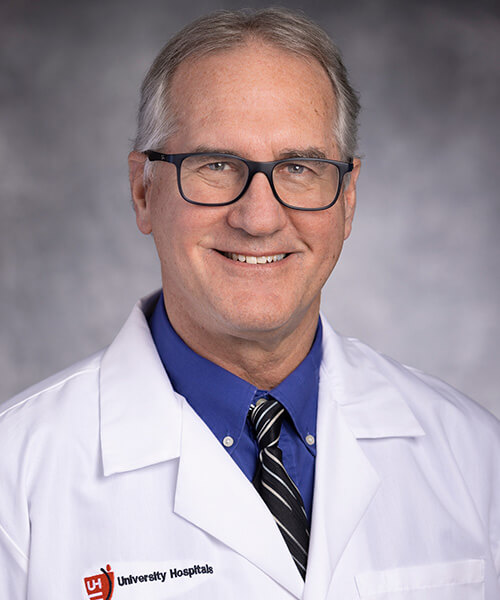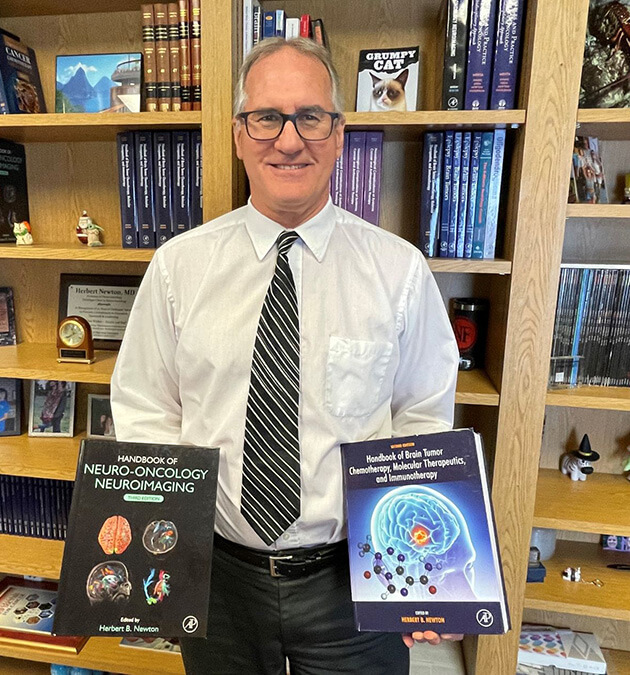Leader of the Band: Bass-playing Neuro-oncologist Leads Brain Tumor Center
March 21, 2023
UH Clinical Update | March 2023
A pioneer in neuro-oncology with a passion for music is the new Medical Director of the Brain Tumor Center at University Hospitals Seidman Cancer Center.
 Herbert Bruce Newton, MD
Herbert Bruce Newton, MDHerbert Bruce Newton, MD, FAAN, is a veteran neuro-oncologist and bass-playing physician who connects with his patients clinically and creatively. For more than 35 years, Dr. Newton has focused on brain tumors. When he trained as a fellow at Memorial Sloan-Kettering Cancer Center in the late 1980s, patients with a glioblastoma multiforme tumor typically lived a year if treatment went well. Now, survival rates beyond two years have significantly improved. Dr. Newton has had many patients live three to five years or more.
“The greatest advancements have been in the understanding of the molecular features that create these tumors, and how the molecular genetics is now often more important than the histology and how the tumor looks under the microscope (e.g., IDH-1 mutations, 1p/19q co-deletions, EGFR amplification),” says Dr. Newton, who helped build the neuro-oncology department at The James Cancer Hospital at The Ohio State University Wexner Medical Center and has written numerous textbooks on the topic. “This molecular knowledge hasn’t allowed for treatment advances as powerful as we see in lung tumors and breast tumors so far, but is edging in that direction.
“I work to keep those patients neurologically stable to maintain their quality of life.”
Prolific in Publishing
At UH and UH Seidman Cancer Center, Dr. Newton wants to bring in more fellowship-trained neuro-oncologists to help grow the program. He plans to work closely with Tiffany Hodges, MD, of Neurosurgery and Serah Choi, MD, PhD, of Radiation Oncology to help expand the neuro-oncology clinical trials portfolio to better serve UH patients across Northeast Ohio.
The prolific author who has published hundreds of articles in medical journals as well as multiple medical textbooks is donating some of his textbooks to UH Cleveland Medical Center’s Core Library. The “most comprehensive books in print” on their topics, Dr. Newton says both have an international host of authors who are all leaders in their respective fields at major academic institutions in the United States, Canada, Europe and Israel. These books, with over 800-1,000 pages, are:
- The Handbook of Neuro-Oncology Neuroimaging, 3rd Edition, 2022, which thoroughly covers imaging of brain tumors and neuro-oncology topics such as physics, advances in imaging, individual tumor types, complications of treatment and pseudo-progression.
- The Handbook of Brain Tumor Chemotherapy, Molecular Therapeutics, and Immunotherapy, 2nd Edition, 2018, which extensively covers the molecular biology of brain tumors and molecular therapies, with chapters on individual tumor types.

Sparking Clinical, Creative Interests
Dr. Newton’s interest in cancer was spurred at Roswell Park Comprehensive Cancer Center in Buffalo, where he obtained a Master of Science degree in cancer chemotherapy and pharmacology. Previously a psychology major, he shifted to neurology and neurosurgery in medical school at SUNY Buffalo. He completed numerous fellowships in medical school, including research on cerebral revascularization.
During his residency at the University of Michigan, he began working with Dr. Harry Greenberg, the Director of the Neuro-Oncology Program. They bonded, and it set him on a path working with brain cancer patients. Dr. Newton spent 25 years as an attending physician and Director of Neuro-Oncology at The Ohio State University Medical Center and also served as a Professor of Neurology and Director of the Division of Neuro-Oncology for nearly a decade. For the past six years, Dr. Newton was Medical Director of the Neuro-Oncology Center at Advent Health Cancer Institute in Orlando, Fla. While at Advent, he also led the Integrative & Creative Arts Therapy Program that was closely intertwined with the brain tumor clinic.
He played classical piano and trombone as a boy and picked up the electric bass as a parent to connect with his musically talented son, who is now a professional guitar player and music producer. Before long, he was organizing classic rock bands and benefits for the cancer programs where he worked.
Intrigued by the way the brain processes music, Dr. Newton has studied and lectured on music and brain function and also written a book chapter on the topic. He notes that a physician with a trained eye can discern differences between the brains of musicians and non-musicians on Functional MR and PET imaging.
“The circuitry in the brain that underlies our ability to analyze, process, and appreciate music are mostly remnants of the parts of the brain that mediate the human ability to speak,” Dr. Newton says. “So the musical ability in our brains has been in place for many thousands of years and is heavily involved in our emotional circuits – pleasure/positive valences and dislike/negative valences. The human brain is ‘pre-wired’ in most people to enjoy and appreciate music.”
In working with brain tumor patients, he has applied the benefits of music therapy. The results have been nothing short of inspirational.
“There are evolutionary and paleological reasons why music is so intrinsic to brain function,” says Dr. Newton. “A lot of physicians are musicians. I give myself my own music therapy.”


